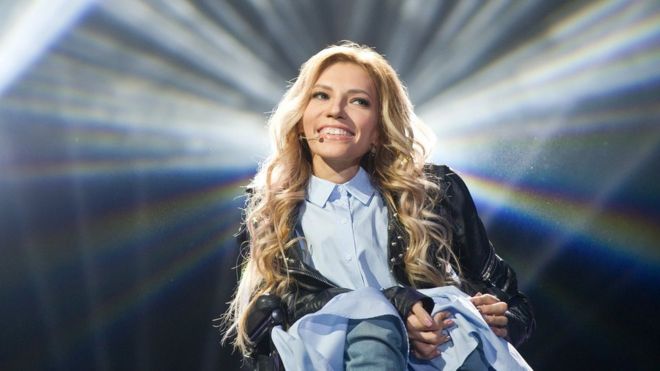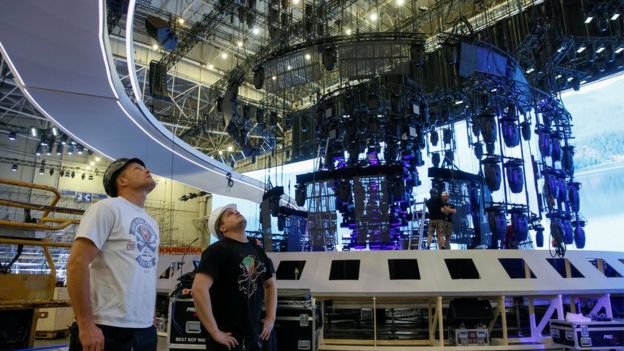Eurovision: Russia will not broadcast contest after Ukraine ban
 EPA
EPA
Russian broadcaster Channel One will not broadcast the Eurovision Song Contest next month because the country's singer has been barred from host country Ukraine.
Russia's decision removes any chance of it competing this year, the European Broadcasting Union (EBU) said.
Ukraine is refusing to allow Julia Samoilova to perform at Eurovision because she has visited Crimea, the peninsula seized by Russia in 2014.
The EBU has condemned the ban.
It says Ukraine is undermining the non-political nature of the contest.
The union, which produces Eurovision, said it had offered two possible solutions to Channel One. The proposals were for Ms Samoilova to perform via satellite from Russia or for another contestant to be allowed to travel to Ukraine to take her place.
Both were rejected and the broadcaster has now announced it will not televise the event.
"Unfortunately this means Russia will no longer be able to take part in this year's competition," the EBU said. "We very much wanted all 43 countries to be able to participate and did all we could to achieve this."
Ukraine banned the Russian performer under a law which excludes anyone who entered Crimea via Russia.
Frank Dieter Freiling, chairman of the event's steering committee, said the ban "thoroughly undermines the integrity and non-political nature" of the contest and its mission to unite nations in friendly competition.
But he added: "Our top priority remains to produce a spectacular Eurovision Song Contest in May."
 REUTERS
REUTERS
Russia and Ukraine have been at loggerheads since the annexation of Crimea and the subsequent separatist conflict in east Ukraine which Moscow is accused of stoking.
Ukraine is hosting Eurovision because its singer, Jamala, won in Sweden last year. She took the crown with 1944, a song about Josef Stalin's mass deportation of Crimean Tatars during World War Two.
The alleged political overtones of the song annoyed many Russians.
Moscow is especially irked by the ban on Samoilova, 28, as she uses a wheelchair and the slogan of this year's Eurovision is "Celebrate diversity".

Who is Julia Samoilova?
 CHANNEL ONE RUSSIA/ EVN
CHANNEL ONE RUSSIA/ EVN- Born in April 1989 in Ukhta, Russia
- Her song Flame is Burning was composed by Leonid Gutkin, who also produced Russia's 2013 and 2015 entries
- Has been in a wheelchair since childhood, suffering from spinal muscular atrophy: a neuromuscular disorder causing muscle wastage
- She was a 2013 finalist in Russia's X Factor competition and performed at the opening ceremony to the 2014 Sochi Winter Paralympics
No comments:
Post a Comment